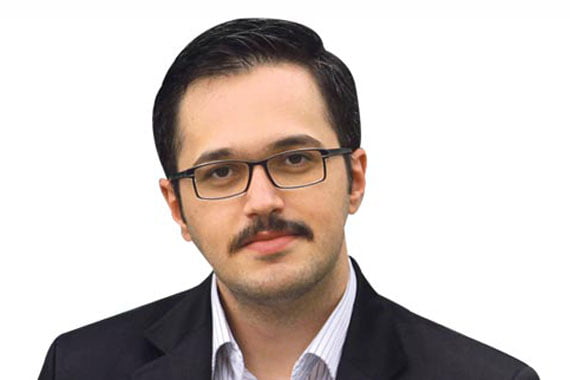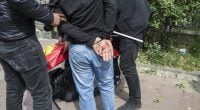Caucasus analyst Öztarsu: Only dialogue can solve Turkish, Armenian problems

Date posted: October 29, 2013
YONCA POYRAZ DOĞAN, İSTANBUL
Though Turkey’s relations with Armenia have been strained by a number of historical and political issues, a Turkish Caucasus analyst who lived and studied in Armenia points out in his new book that only dialogue can solve problems.
“There is a great panorama of civil society activities, and I can say that our political problems will be solved by these initiatives. Young and liberal people come together and discuss their own agendas without any political motivations,” Mehmet Fatih Öztarsu said for this week’s Monday Talk.
Turkey recognized the state of Armenia soon after its 1991 independence. However, Turkey closed its border with Armenia in 1993 because of its war with Azerbaijan over the disputed region of Nagorno-Karabakh.
In October 2009, Turkey and Armenia signed a historic accord in Switzerland normalizing relations after a century of hostility. Under the agreement, Turkey and Armenia were to establish diplomatic ties and reopen their shared border. But the accords never went much further.
Since the protocols were signed, Turkey has been insisting that their ratification be linked to the successful resolution of the Nagorno-Karabakh issue, a precondition that was not part of the original negotiations between Ankara and Yerevan. On the other hand, Armenia wants Turkey to recognize the 1915 killing of hundreds of thousands of Armenians as an act of genocide, but Turkey refuses to do so.
On Oct. 10 this year, the signing’s fourth anniversary, Turkish Foreign Minister Ahmet Davutoğlu suggested that Turkey is still trying to find ways to move forward.
Answering our questions, Öztarsu talked about the possibility of this and his experiences living in Armenia.
Let’s start with the title of your book, “But Which Turks and Armenians?” Why did you choose this title for your book?
Two nations have their own image against each other. There is an image of “enemy,” but nobody knows who this enemy is. I want to clarify this issue and create a new perspective on definitions. We are two nations, as Turks and Armenians, of [the] same geography, and these people lived together for centuries [with] a common cultural background. We should be careful while we are discussing the historical conflict. There is a problem, but nobody knows which Turks and Armenians are subjects of this dispute. Do we point out the Turks and Armenians of the 20th century or today’s nations? Should we care only about our ancestors or today’s generation? We can understand each other by asking these questions first.
Is there a personal reason why the Caucasus have been an interesting area of work for you?
I graduated from university in Baku. I lived there for five years, and all specialists of the international relations department at the university were expected to choose a region to develop an expertise. I decided to be an expert on the Caucasus, which is one of the most prominent areas for Turkish scholars.
What has it been like living and studying in Armenia? What was the most unexpected thing for you while living there?
First of all, it is so hard for a Turk. I lived in a country [that] has a political and social opposition against Turkey and Turks. There is no Turkish diplomatic mission there. I had two challenges. First, I was living there as a foreigner and as a Turkish person. Second, I started my master’s degree as a Turkish student. There are too many legal problems because you [need to] apply to the Ministry of Education for being a student. But your documents cannot be approved easily without many bureaucratic confirmations. The nationality section [on my ID card] was written inaccurately [on my] first documents; according to the Armenian authorities, I was a Syrian student and my country was the Syrian Arab Republic, because they couldn’t believe that I applied for a master’s program in an Armenian university as a Turkish person. I faced multifarious problems, but the police interrogation was the most unexpected thing for me. They asked me why I came to Yerevan and [why I] wanted to be student. Several times they … asked unintelligible questions. Some of them kindly told me to leave their country as soon as possible before something bad happened to me.
Have you ever felt that your life was in danger while living in Armenia?
It is very normal to feel your life is in danger as a Turk there. I am sure that ordinary people would not do anything to harm me, but police are different. Pressure [from] the police created some concerns in my daily life. Because they wanted me to leave their country, they were looking to find something [so they could] deport me. They couldn’t find anything, but somebody in [the] government [got in the way of] my education. Finally, the dean of the faculty that I had applied to declared that they don’t want to see any Turkish students in their university.
‘University dissolved my right of education on gov’t orders’
So you were not able to complete your education in Armenia?
My university dissolved my right of education seven months after my registration because the Armenian government doesn’t want to provide education [to] a Turk. I had to leave the university, although all of my professors tried to prevent it. This is an important concern for anybody who would like to study or do business in Armenia. There is no Turkish diplomatic mission, so there is nothing to do in an emergency situation. On the other hand, the Armenian government must ensure [the] rights of everybody, not discriminate against them, under its international obligations.
What happened in the end?
I transferred my credits to a Georgian university in Tbilisi and completed my master’s education. Some of my lecturers [were] fired at my previous university in Armenia because they were defending my rights against their government’s decision. An ironic [event] took place: All of my friends apologized on behalf of their state. According to them, this is one of the most important problems of Yerevan officials who [put] pressure on foreigners, especially Turks. Soviet mentality still persists; the Soviet Union didn’t collapse in Armenia in that regard. I know too many strange stories of Turks who try to work in Armenia. Most of them are under the threat of Yerevan officials, and the same politicians blame Turkey on the issue of Armenian migrants.
Very few people in Turkey know Armenia and the way people live there. What myths do you think Turks have against Armenia?
We are thinking that this state is totally against Turkish people. So there is no trust [that would make them want] to visit and meet its people. I share several examples about myths in my book. I always defend dialogue among people. Turkish and Armenian people share a great historical and cultural background. You can find various common values if you meet an Armenian. Political pressure is a negative factor on perceptions. Both governments have unfavorable approaches at [the] political level.
From your stories in the book, we get the feeling that Armenian civil society has been working well with Turkish civil society. How effective are they and how much support do they get? Has this work between the two civil societies been diminished because initiatives to start diplomatic relations between Turkey and Armenia failed?
There is a great panorama of civil society activities, and I can say that our political problems will be solved by these initiatives. Young and liberal people come together and discuss their own agendas without any political motivations. They can find financial support from Western organizations. Their work is valuable; they create reports, surveys and tangible projects. I think civil society can build a ground[work] before diplomatic relations. We need to establish an environment of trust at the level of the people. Most of the Turkish and Armenian people were against the normalization process because of unsatisfactory civil initiatives. But today, the situation is different and civil society activists can take a leading role on the normalization of relations.
‘Two sides not politically ready to move forward’
There have been past reports in some media organizations that diplomatic relations might start between Turkey and Armenia behind the scenes. Do you think this is likely?
Some media organs have interesting news on secret talks. I don’t think that this is real and logical. First of all, Ankara and Yerevan are on opposite sides because of political concerns, and public opinion is very important for the two governments. Today, [the] two sides are not ready politically and reports of secret talks are not credible.
Davutoğlu said just very recently that Turkey attaches importance to its relations with Armenia and to developing new solutions for better ties. He added that, for lasting relations, Armenia has to deal with the problems in the South Caucasus, particularly those related to Azerbaijan. He spoke in Switzerland, where Turkey and Armenia had signed twin protocols in 2009 in order to normalize their ties, but as we all know, the protocols have failed. What do you make of Davutoğlu’s statement in Switzerland?
I think Mr. Davutoğlu wants to draw the attention of Yerevan and Baku. Armenia is being the Kaliningrad of the Caucasus region by participating in the customs union. Armenia’s political, economic and security dependence on Russia will continue. On the other side, Ilham Aliyev won elections for the third time in Azerbaijan and he will create a new kind of policy, because the region and the world are changing. Mr. Davutoğlu’s statement seem [to show] that Ankara wants to play a role in the Karabakh issue on the eve of important developments. Karabakh is a key subject in Turkish-Armenian relations. Thus, Turkish officials should work for a consensus between Yerevan and Baku.
What is your evaluation of the news of a September announcement that Armenia would be entering into a customs union formed by a Russian initiative?
This is an indispensable decision of Yerevan. 2013 has been a year of great protests in Armenia. Especially the energy crisis created a strong opposition. Russia follows its traditional policy to create pressure over some governments such as Yerevan, Kiev and Tbilisi to be a part of the customs union. Natural gas prices have been rising, and the opposition started to mobilize people against the Armenian government. Yerevan declared its decision to join the customs union suddenly and abolished the danger of a possible revolution.
In less than two years, in 2015, Turkey will find itself in a tough situation during the events commemorating the centennial of the “Armenian genocide.” Is there anything that the Turkish government can do to build something constructive for the relations?
2015 projects are up to officials in Ankara. Our bureaucrats say that they have their own plans and, unfortunately, nobody pays attention to the offers of the Caucasus analysts. There should be projects to improve dialogue between Turks and Armenians. There is [the] Public Diplomacy Coordination Department of the Turkish Prime Ministry. This department can produce films and organize seminars and conferences. The Turkish government should welcome Armenians to Turkey without any preconditions. Our main problems can be solved only through dialogue. The two sides don’t know each other. Turkey should be aware of Turkey’s responsibilities as a regional power and establish Turkish-Armenian relations without foreign intervention.
PROFILE: Mehmet Fatih Öztarsu
Graduating from the International Relations department at Baku Caucasus University, Mehmet Fatih Öztarsu studied for his master’s degree in political science and Caucasus affairs at the European Regional Academy of Armenia and Ilia State University in Georgia from 2011-2013. He is the only Turkish analyst who studied in Baku, Yerevan and Tbilisi. He worked as a media observer in the USA with the partnership of the International Center for Journalists (ICFJ) and joined the politics and leadership program of the Atlantic Council in both Washington, D.C., and New York. He is a member of the Young Turkey Young America fellowship program at the Atlantic Council. He writes articles for the Today’s Zaman and Zaman dailies in Turkey and Aravot in Armenia. Currently, he is co-president of the Strategic Outlook Institute based in Turkey’s Konya province, and he lives in Tbilisi as a freelance journalist and Caucasus analyst.
Source: Today's Zaman , October 27, 2013
Tags: Armenian issue | Turkey |
























